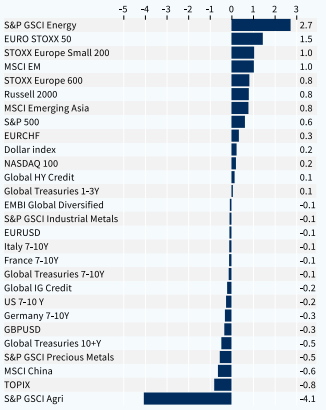
Interest rate cuts gather steam; French risk premium stabilizes
681 Monday, 24 June 2024 16:41
Divergent Opinions in External Articles - The opinions expressed in articles from external sources do not necessarily reflect the views of Renalco SA and are shared for informational purposes only.
At this point in time, you are probably fed up with French elections and the associated market uncertainty. Yet, we cannot elude the topic one week ahead of the historical election that is likely to put the far-right in the driving seat.
As such, we discuss below the factors behind the recent stabilization of the French risk premium and why we think it is unlikely to tighten in the near term.
The tree that hides the forest? (aka why we stay bullish on bonds). As we focus on political risks in the euro area, we might fail to appreciate mounting signals suggesting that inflation is falling into an area of tolerance for central banks. Last week, the UK and Japan CPI came in below consensus expectations, and the Swiss national Bank managed to cut rates for the second time in a row. Interestingly, central banks appear to be gaining room to soften their monetary stance at a time when it is becoming increasingly necessarily to tighten fiscal policy. The BoC, the SNB and the ECB have started to move forward with rate cuts. Now the BoE and the Fed are next in line, probably in August or September, for their first rate cut.
Let’s talk about France and why the risk premium has stabilized. We see two factors behind the rebound of Euro area equities last week and the stabilization of the OAT/ Bund spread. First, markets found reassurances from Macron that he will not resign, whatever the outcome of the election. Second, the far-right has showed signs of fiscal awareness with regards to their expansionary program, that was initially conceived for the 2022 presidential election.
- Although we see several possible outcomes that may contribute to assuage market concerns (a far-right in France more orthodox than expected on the fiscal front, “à la Meloni”; a broad coalition and caretaker government like in the Netherlands), we believe the French risk premium is unlikely to tighten in the near term. And the reason is simple: fiscal consolidation is required, but no one is talking about that because you don’t get votes if you talk about sensitive issues. France entered the excessive deficit procedure from the EU, and pressure from rating agencies is very likely. Even in the best-case scenario of mild consolidation being agreed with the EU Commission, would the bond market really attribute any credibility to the government? So “higher for longer” seems to be the likely scenario, in our view, for French credit spreads.
What does this mean for French and European stocks? Inside, we include some interesting charts showing how a rise in bond spreads affects stocks by sector and country in Europe. We have seen some French exceptionalism at work since Macron was elected, as the MSCI France has largely outperformed its German and UK counterparts. While Germany might have been hit by the emergence of the global trade war and its Russian gas reliance, the UK has obviously faced the consequences of Brexit (stagflation).
- Having said that, while Macron can be praised for his corporate tax cut, and his wave of reforms in the labour market, it’s interesting to note that the success story for the CAC40 since Macron won his first mandate has been driven primarily by global growth stocks (Luxury, Cap goods and Aerospace, Chemicals, Technology), while the more domestic stocks, including those with a French state interest (Renault, Orange), have performed pretty poorly.
What can we say about the next few quarters for French stocks?
- The valuation of the French market isn’t at a “screaming buy” level. The reality, of course, is that this average is very polarised between domestic assets that are low growth/cheap and global winners that are still expensive. We prefer the latter as European (and French) domestic assets are unlikely to enjoy the next few months until enough rate cuts start reviving the domestic economy and until the EU commits to a growth agenda with meaningful measures.
- On the latter point, the paradox is that although the French far right will get very little “respect” from Scholz’s Germany or Mrs Van der Leyen, they are highlighting what many center-right MPs think: ESG needs to be more pragmatic and scaled down to revive investments in the eurozone.
- Meanwhile, the global winners on the European (and French) stock exchanges risk being caught in the global trade war fire and the likely slowdown of the US economy. The US elections are a massive uncertainty with respect to both points. We thus recommend sitting tight in Defensive stocks.
WEEK AHEAD: US Conference board consumer confidence (Wednesday), US Personal Consumption (Friday), US presidential debate (Thursday at 9:00 pm EST), French snap parliamentary elections debate (Tuesday at 9:00 pm CET).
Asset classes performance - weekly (%)


Copyright © 2024 Kepler Cheuvreux. All rights reserved.
This document is produced by Kepler Cheuvreux, an investment firm authorized by the ACPR under number 14441 and regulated by the Autorité des Marchés Financiers, incorporated in France under number RCS 413 064 841 at the following address: 112 Avenue Kleber, 75116 Paris, France (www.keplercheuvreux.com).
This document does not constitute a prospectus/regulatory document or other offering document, nor does it constitute an offer or solicitation to purchase securities or other investments. It should not be construed as an offer to sell or a proposal to buy any securities in any jurisdiction in which such an offer or proposal would be unlawful. We are not soliciting any action on the basis of this document, which is provided to our clients for general information purposes. It does not constitute an investment recommendation or a personalized recommendation, and does not take into account the investment objectives, financial situation and needs of each client. Before acting on the contents of this document, we advise you to check whether it is suitable for your particular situation and, if necessary, to seek professional advice.
The figures relating to past performances refer or relate to past periods and are not a reliable indicator of future results.
The accuracy, completeness or timeliness of information from external sources is not guaranteed, although it was obtained from sources reasonably believed to be reliable. Kepler Cheuvreux assumes no responsibility in this regard.
Information provided in this document concerning market data is retrieved from databases at a precise period of time and is subject to variations.




